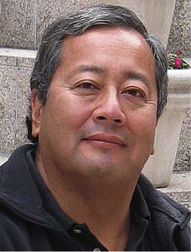
Arthur Paul Shimamura
Professor of Psychology, Emeritus
Art Shimamura was a cognitive neuroscientist and renowned memory researcher in the Department of Psychology and Helen Wills Neuroscience program. He received his Ph.D. in 1982, and was appointed as an assistant professor at UC Berkeley in 1989. His initial research focus was in the area of memory, including the study of individuals with memory disorders. While this remained a focus throughout his career, Art’s interests expanded into multiple domains, all of which he ultimately combined into new theories regarding the mind and brain. He authored or edited 9 books and published over 100 papers on topics ranging from amnesia, visual illusions, the frontal lobes, art appreciation, and how to maintain a healthy brain.
Art’s life was filled with family, art, and psychology. Born in Los Angeles on June 26, 1954, he grew up in Southern California in a loving family that extended from L.A. to Washington State and Japan, and to whom he remained close his entire life. Art’s approach to his many scientific and nonscientific interests could be described as intensely joyful. He had many passions in his life. Art loved being in the water, a proclivity that led him to do his undergraduate studies at the UC Santa Barbara where he participated in both water polo and long distance swimming. Later, as a faculty member at UC Berkeley, he swam the Shark Fest, from Alcatraz to San Francisco.
While an undergraduate at the University of California Santa Barbara, Art was seduced by another passion: science. Working in the lab of Walter Gogel, Art became intrigued with the idea that science was the way to approach many problems. After graduating from UCSB, Art went on to obtain his Ph.D. in Psychology from the University of Washington, supervised by Geoffrey Loftus. While there, he took up photography, another passion that would later become important in his scientific and personal life. From 1982 to 1989, Art was a postdoctoral fellow and staff scientist at UC San Diego, working with Larry Squire. Art’s work at UCSD was part of the first wave of cognitive neuroscientists, co-authoring some of the most influential studies of memory disorders. This early work, including more than 30 articles in top journals, resulted in Art being ranked the 9th most-cited psychologist for 1986-1990, in an APS Observer survey of highest impact authors.
Art’s pioneering work in cognitive neuroscience continued after joining the faculty at UC Berkeley in 1989. While he continued his work involving brain-injured patients, he also conducted important neuroimaging studies of learning, memory, and cognitive functioning in the normal brain, leading to a novel theory concerning the role of the parietal lobe in memory retrieval. In 1994, Art edited an influential book on metacognition with Janet Metcalf (Metacognition: Knowing about Knowing) and co-founded the Cognitive Neuroscience Society, now in its 28th year. A year later, he published a study that evaluated cognitive aging in UC Berkeley professors, finding that a combination of intelligence and ongoing mental activity may compensate for age-related changes in cognition. He went on to explore various forms of cognitive control and how the frontal lobes mediated executive functioning as well as source memory, temporal order judgments, emotion and metamemory. Art’s eclectic approach to his work allowed him to explain learning and memory as an elegant mix of various cognitive functions and neurological mechanisms.
Art found great satisfaction in finding links between his academic interests and his passion for photography and film. Reflecting his early interest in visual perception at UC Santa Barbara, he developed and tested a theory to account for optical illusions, explaining how we perceive an object’s orientation regardless of how our eyes or body are oriented. With his flair for historical research, he contributed a fascinating article to History of Photography on the early 20th century photographer Edward Muybridge, making the case that Muybridge’s creative inspiration could be traced to personality changes that came about following a severe traumatic injury to the frontal lobes.
Towards the end of his career, his interest in photography enabled him to be one of the pioneers in the empirical study of aesthetics. A John Simon Guggenheim fellowship enabled his 2013 book, Experiencing Art: In the Brain of the Beholder and the book Psychocinematics: Exploring Cognition at the Movies (2014). With another pioneer in this new field, Steve Palmer, also a UC Berkeley Psychology professor, he edited the book, Aesthetic Science: Connecting Minds, Brains, and Experience (2013).
In 2015, Art retired and moved to the North Shore of O’ahu with his wife and soulmate, Helen Ettlinger. He traveled the world, camera in hand, to capture broad landscapes and exquisite details in environments ranging from New Zealand to Alaska (https://artshimamuraphotography.wordpress.com/). He continued to write, but turned his attention to books for the general public, distilling his knowledge from science (Five Steps Toward a Healthy Brain, 2017, and MARGE: A Whole-Brain Learning Approach for Students and Teachers, 2018). He continued to write even after his cancer diagnosis, with a book describing his walk around the island of O’ahu (A Walk Around O‘ahu: My Personal Pilgrimage, 2019) and a blog for Psychology Today (“Maintaining an active brain and body even after cancer”).
Art was a wonderful teacher and mentor. He won a UC Berkeley Distinguished Teaching award in the Division of Social Sciences in 1996. His Psychology 1 class was a campus favorite with his unique combination of science and humor. Art was an Osher Fellow & Science Advisor at the Exploratorium Science Museum in San Francisco. With his clarity of thought and calm but intensely joyful demeanor, Art generously provided advice and guidance to his students as well as to a broad range of scientists around the world. He is greatly missed by his wife, two sons, and all of us, after his far too early death on October 6, 2020.
Bill Prinzmetal
Nina Dronkers
Ken Paller
Rich Ivry
2021
